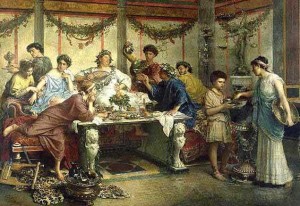 For Epicurus, pleasure is tied closely to satisfying one’s desires. He distinguishes between two different types of pleasure: ‘moving’ pleasures and ‘static’ pleasures. ‘Moving’ pleasures occur when one is in the process of satisfying a desire, e.g., eating a hamburger when one is hungry. These pleasures involve an active titillation of the senses, and these feelings are what most people call ‘pleasure.’ However, Epicurus says that after one’s desires have been satisfied,(e.g., when one is full after eating), the state of satiety, of no longer being in need or want, is itself pleasurable. Epicurus calls this a ‘static’ pleasure, and says that these static pleasures are the best pleasures.Because of this, Epicurus denies that there is any intermediate state between pleasure and pain. When one has unfulfilled desires, this is painful, and when one no longer has unfulfilled desires, this steady state is the most pleasurable of all, not merely some intermediate state between pleasure and pain.
For Epicurus, pleasure is tied closely to satisfying one’s desires. He distinguishes between two different types of pleasure: ‘moving’ pleasures and ‘static’ pleasures. ‘Moving’ pleasures occur when one is in the process of satisfying a desire, e.g., eating a hamburger when one is hungry. These pleasures involve an active titillation of the senses, and these feelings are what most people call ‘pleasure.’ However, Epicurus says that after one’s desires have been satisfied,(e.g., when one is full after eating), the state of satiety, of no longer being in need or want, is itself pleasurable. Epicurus calls this a ‘static’ pleasure, and says that these static pleasures are the best pleasures.Because of this, Epicurus denies that there is any intermediate state between pleasure and pain. When one has unfulfilled desires, this is painful, and when one no longer has unfulfilled desires, this steady state is the most pleasurable of all, not merely some intermediate state between pleasure and pain.
Epicurus also distinguishes between physical and mental pleasures and pains. Physical pleasures and pains concern only the present,
whereas mental pleasures and pains also encompass the past (fond memories of past pleasure or regret over past pain or mistakes) and the future (confidence or fear about what will occur). The greatest destroyer of happiness, thinks Epicurus, is anxiety about the future, especially fear of the gods and fear of death. If one can banish fear about the future, and face the future with confidence that one’s desires will be satisfied, then one will attain tranquility (ataraxia), the most exalted state. In fact, given Epicurus’ conception of pleasure, it might be less misleading to call him a ‘tranquillist’ instead of a ‘hedonist.’